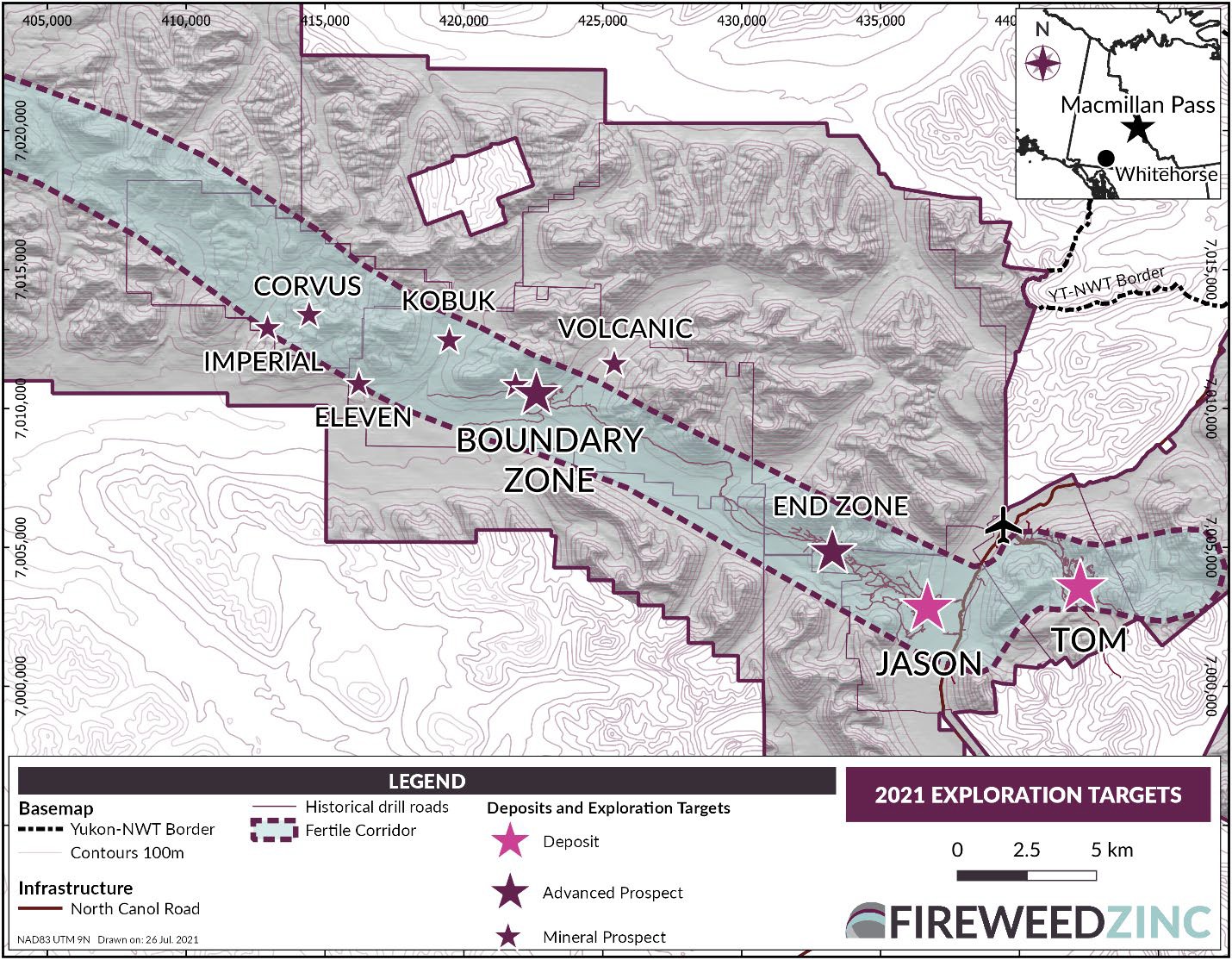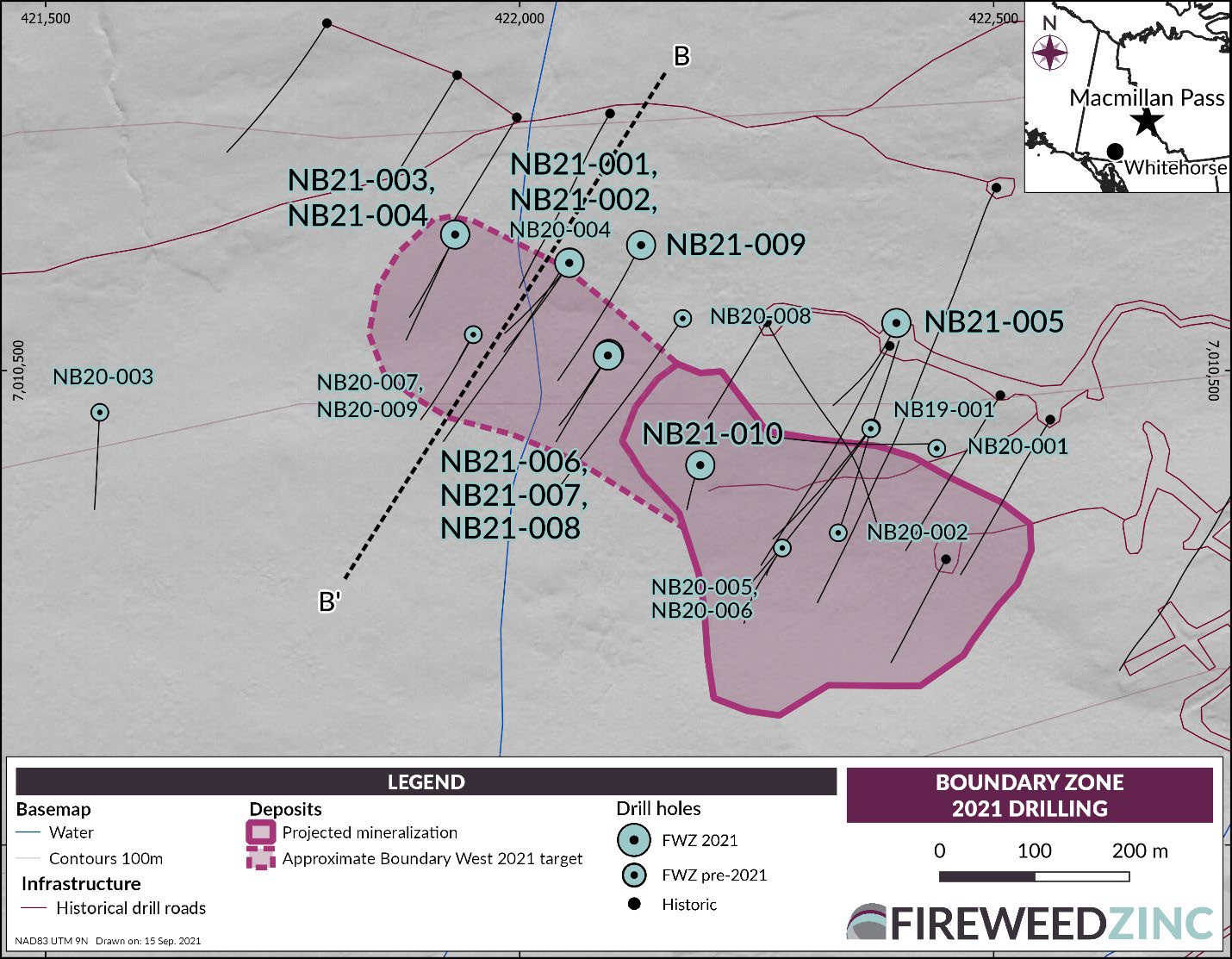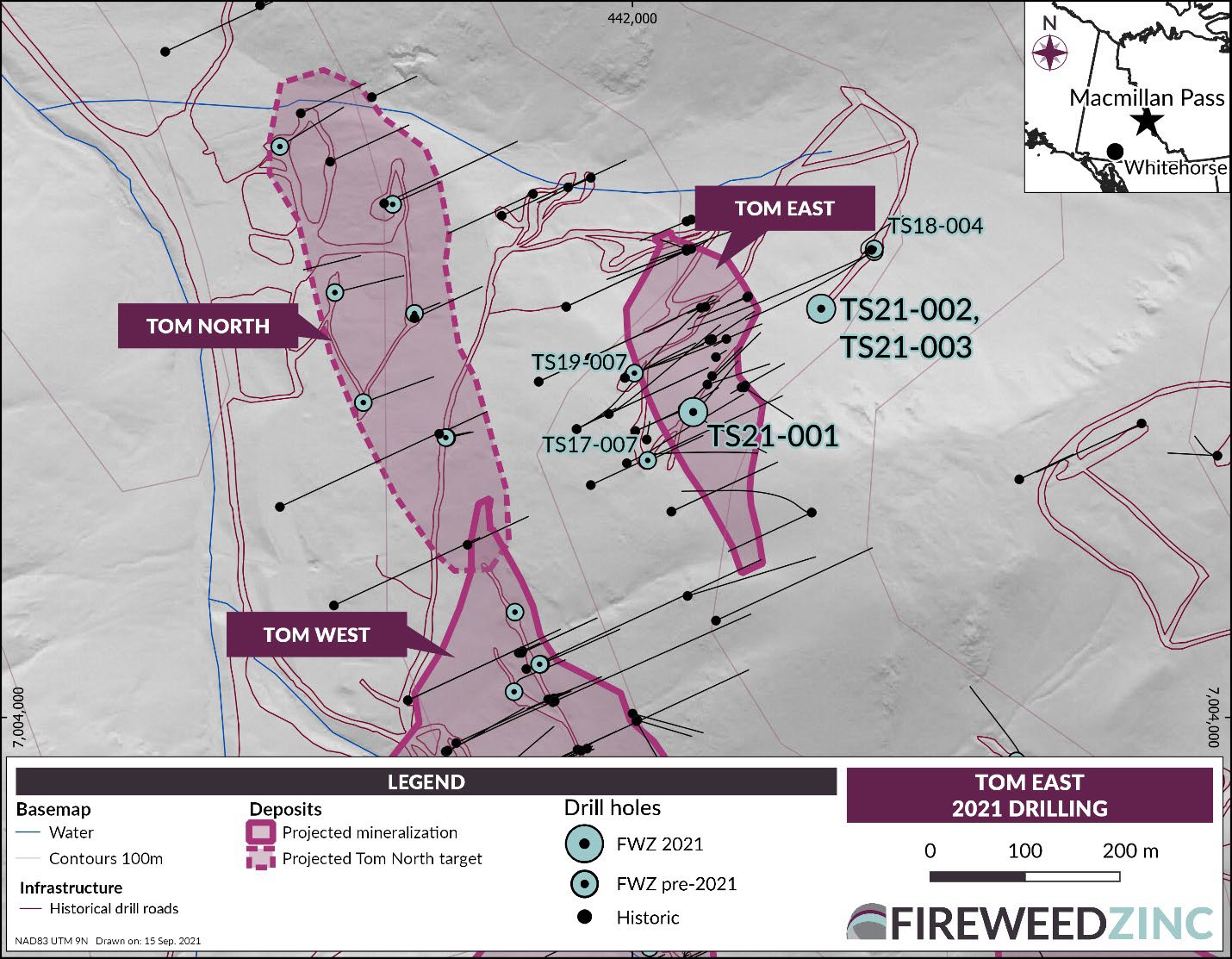Fireweed Intersects Three Distinct High-Grade Zinc Zones Including 23.77% Zinc, 3.44% Lead, and 75.7 g/t Silver Over 10.42 m in New Zone at Boundary West
September 16, 2021
Vancouver, British Columbia: FIREWEED ZINC LTD. (“Fireweed”) (TSXV: FWZ) is pleased to announce the results from the second drill hole at Boundary West for the 2021 Macmillan Pass zinc-lead- silver project drill program, Yukon, Canada.
Highlights
- Three distinct zones of zinc-lead-silver mineralization were intersected in a step-out hole at Boundary West, including a newly discovered zone of high-grade laminated stratiform mineralization similar in style to the Tom and Jason deposits.
- The new stratiform zone graded 23.77% zinc, 3.44% lead, and 75.7 g/t silver over 10.42 m within a broader zone of 9.91% zinc, 1.64% lead and 39.6 g/t silver over 32.99 m.
- Massive to semi-massive sulphides under the stratiform interval ran 8.22% zinc, 0.71% lead, 53.6 g/t silver over 60.68 m including a higher-grade massive-sulphide zone of 10.36% zinc, 0.94% lead, and 66.7 g/t silver over 40.08 m.
- A broad zone of vein-hosted mineralization at shallow depths in the hole returned 4.57% zinc, 0.02% lead, and 7.9 g/t silver over 40.24 m including a higher-grade zone of 9.99% zinc, 0.06% lead, and 17.4 g/t silver over 13.40 m.
CEO Statement
Brandon Macdonald, CEO, stated “This step-out hole at Boundary West has delivered not one, but three very impressive intersections over significant widths. Encouragingly, these three intersections represent three separate zones of mineralization, including the first full intersection through the newly discovered Tom-Jason style laminated stratiform mineralization. This hole demonstrates that the new zone has very high grades of zinc, lead, and silver and opens up the rest of the Boundary area to exploration for this style of mineralization. We are also very pleased to see the grades increasing with depth in the massive sulphide mineralization and in the vein-hosted mineralization. This suggests that at Boundary West there is great expansion potential at depth, where even higher grades may be anticipated. A very successful 2021 drill program is now wrapped up after hitting mineralization in each of the ten holes drilled at Boundary Zone and we eagerly await the assay results from the remaining holes.”
Chairman John Robins added “The discovery of yet another high-grade zone this summer further reinforces my belief that Fireweed’s Macmillan Pass project is one of the most exciting exploration projects I have ever been involved with.”
Boundary Zone Drilling
At Boundary West (Map 1, Map 2) diamond drill hole NB21-002 cut a complete intersection of newly discovered laminated, stratiform zone of zinc-lead-silver mineralization grading 9.91% zinc, 1.64% lead, and 39.6 g/t silver over 32.99 m including a very high-grade zone of 23.77% zinc, 3.44% lead, and 75.7 g/t silver over 10.42 m (Table 1, Cross Section 1). This new zone was partially intersected in NB21-001, where the upper portion was truncated by a fault (as reported in Fireweed news release dated 17th August 2021). In NB21-002, the new zone comprises finely laminated sphalerite-galena-pyrite hosted by laminated and silicified mudstone. The sphalerite is tan to pink in colour and combined with the presence of abundant fine-grained galena, suggests that the mineralization is proximal to a feeder structure. The style of the mineralization is similar to that encountered adjacent to, but not directly overlying, the feeder structures at Tom and Jason. If similar characteristics are encountered at Boundary West, there is potential to expand mineralization to depth along the interpreted vector to the feeder structure, where red to brown sphalerite, even higher grades, and massive sulphides may occur.
A zone of massive to semi-massive sulphides was encountered in NB21-002, stratigraphically below the newly discovered zone of laminated stratiform sulphides (Cross Section 1). The massive to semi-massive sulphides graded 8.22% zinc, 0.71% lead, and 53.6 g/t silver over 60.68 m, including a higher-grade massive sulphide intersection of 10.34% zinc, 0.94% lead, and 66.7 g/t silver over 40.08 m (Table 1). The massive sulphide comprises massive pyrite-sphalerite-galena, and the intersection in NB21-002 contained higher zinc grades due to a greater abundance of sphalerite than the intersections up-dip in holes NB21- 001 and NB20-004, suggesting that the system is better mineralized with depth where it is open for expansion. This is supported by higher copper concentrations in the massive sulphides with depth, averaging 582 ppm copper (316.39-356.47 m) in NB21-002, compared to low-hundreds of ppm copper in NB21-001 and NB20-004, considered to be geochemically anomalous and indicating closer proximity to the feeder with depth. Very high bulk densities were noted in the massive sulphides.
Table 1: NB21-002 drill hole results
| Drill Hole | From (m) | To (m) | Intersected width (m)1 | Zinc (%) | Lead (%) | Silver (g/t) | Bulk Density (t/m3) | Mineralization Style |
| NB21-002 | 87.10 | 127.34 | 40.24 | 4.57 | 0.02 | 7.9 | 2.87 | Vein hosted |
| >including | 87.10 | 100.50 | 13.40 | 9.99 | 0.06 | 17.4 | 3.03 | |
| >>including | 88.21 | 91.57 | 3.36 | 22.20 | 0.11 | 28.4 | 3.39 | |
| >including | 112.50 | 127.34 | 14.84 | 2.39 | 0.01 | 3.6 | 2.83 | |
| NB21-002 | 175.01 | 208.00 | 32.99 | 9.91 | 1.64 | 39.6 | 3.08 | Laminated stratiform |
| >including | 175.01 | 185.43 | 10.42 | 23.77 | 3.44 | 75.7 | 3.57 | |
| >>including | 179.00 | 183.58 | 4.58 | 36.14 | 5.25 | 100.7 | 3.70 | |
| >including | 190.00 | 202.24 | 12.24 | 2.99 | 1.05 | 29.7 | 2.89 | |
| NB21-002 | 316.39 | 377.07 | 60.68 | 8.22 | 0.71 | 53.6 | 3.86 | Massive to semi-massive sulphides |
| >including | 316.39 | 356.47 | 40.08 | 10.36 | 0.94 | 66.7 | 4.15 | |
| >>including | 335.21 | 342.21 | 7.00 | 13.77 | 1.28 | 96.0 | 4.43 | |
| >>>including | 335.21 | 337.30 | 2.09 | 18.72 | 2.69 | 136.1 | 4.53 | |
| NB21-002 | 403.40 | 410.91 | 7.51 | 1.25 | 0.05 | 4.6 | 3.34 | Laminated stratiform |
1True widths of stratiform, laminated mineralization, and semi-massive or massive sulphide mineralization are estimated to be approximately 30 to 50% of intersected widths. Vein-hosted
mineralization is interpreted to be a stockwork style, similar to Boundary Main, with an undetermined true thickness.
A zone of vein-hosted zinc mineralization intersected at shallow depths (75 to 100 m vertically from surface) graded 4.57% zinc, 0.02% lead, and 7.9 g/t silver over 40.24 m including an intersection of 9.99% zinc, 0.06% lead, and 17.4 g/t silver over 13.40 m. The vein-hosted mineralization comprises pyrite-sphalerite veins cutting chert pebble conglomerate accompanied by flooding of the conglomerate matrix by siderite and minor replacement of the clasts and matrix by sphalerite with minor galena.
Drilling and Exploration Update
The drilling portion of the Macmillan Pass 2021 field program has been completed for a total of 3,850 m in 13 holes. Mineralization has been intersected in every hole at Boundary Zone and Boundary West, including wide massive sulphide zones in holes NB21-002, NB21-003 and NB21-004 (Table 2). Hole NB21-005 was successful in extending zinc mineralization to depth at Boundary Zone. Holes NB21-006, NB21-007, NB21-008, NB21-009, and NB21-010 all intersected zinc mineralization at Boundary West, further defining and expanding the exploration target. Mineralization was also intersected in a hole completed at Tom East, TS21-001 (Map 3). Collar details are provided in Table 3. Assays are pending for all holes apart from NB21-001 (reported in Fireweed news release dated 17th August 2021) and NB21- 002 (reported in this release).
The soil sampling grid over the Kobuk gravity anomaly has been completed, in addition to a small follow-up detailed grid over an area of anomalous lead-in-soil just north of End Zone.
Notes on sampling, assaying, and data aggregation:
The diamond drill core logging and sampling program was carried out under a rigorous quality assurance / quality control program using industry best practices. Drill intersections in this release are all HQ3 (split tube) size core (61.1mm / 2.4-inch diameter) with recoveries typically above 85%. After drilling, core was logged for geology, structure, and geotechnical characteristics, then marked for sampling and photographed on site. The cores for analyses were marked for sampling based on geological intervals with individual samples 1.5 m or less in length. Drill core was cut lengthwise in half with a core saw; half-core was sent for assays reported in this news release, and the other half is stored on site for reference. Bulk density was determined on site for the entire length of each sample assayed by measurement of mass in air and mass in water. Sample duplicate bulk density determinations and in-house bulk density standard determinations were each made at a rate of 5%. Since 2017, four in-house bulk density standards (mineralized drill core from the Tom deposit that span a range of densities) have been used and show an acceptable long-term precision. Certified standard masses are used to calibrate the scale balance used for bulk density determinations.
A total of 5% assay standards or blanks and 5% core duplicates are included in the sample stream as a quality control measure and are reviewed after analyses are received. Standards and blanks in 2021 drill results to date have been approved as acceptable. Duplicate data add to the long-term estimates of precision for assay data on the project and precision for drill results reported is deemed to be within acceptable levels. Samples were sent to the Bureau Veritas preparation laboratory in Whitehorse, Yukon, where the samples were crushed and a 500 g split was sent to the Bureau Veritas laboratory in Vancouver, B.C to be pulverized to 85% passing 200 mesh size pulps. Clean crush material was passed through the crusher and clean silica was pulverized between each sample. The pulps were analyzed by 1:1:1 Aqua Regia digestion followed by Inductively Coupled Plasma Mass Spectrometry (ICP-ES/ICP-MS) multi-element analyses (BV Code AQ270). All samples were also analyzed for multiple elements by lithium borate fusion and X-ray fluorescence analysis (XRF) finish (BV Code LF725). Over-limit Pb (>25.0%) and Zn (>24.0%) were analyzed by lithium borate fusion with XRF finish (BV Code LF726). Silver is reported in this news release by method AQ270, and zinc and lead are reported by LF725 or LF726. Bureau Veritas (Vancouver) is an independent, international ISO/IEC 17025:2005 accredited laboratory.
Results in this news release are length and bulk-density weighted averages as would be used in a Mineral Resource estimate. Readers are cautioned that in Fireweed news releases prior to 2020, only length weighted assay averages were reported which may result in slightly lower (under-reported) average values. Length and bulk-density weighted averages have been reported as these most accurately represent the average metal-content of the intersections.
Qualified Person Statement
Technical information in this news release has been approved by Jack Milton, P.Geo., Ph.D., Chief Geologist and a ‘Qualified Person’ as defined under Canadian National Instrument 43101.
About Fireweed Zinc Ltd. (TSXV: FWZ): Fireweed Zinc is a public mineral exploration company focused on zinc-lead-silver and managed by a veteran team of mining industry professionals. The Company is advancing its district-scale 940 km2 Macmillan Pass Project in Yukon, Canada, which is host to the 100% owned Tom and Jason zinc-lead-silver deposits with current Mineral Resources and a PEA economic study (see Fireweed news releases dated January 10, 2018, and May 23, 2018, respectively, and reports filed on www.sedar.com for details) as well as the Boundary Zone, Tom North Zone and End Zone which have significant zinc-lead-silver mineralization drilled but not yet classified as mineral resources. The project also includes large blocks of adjacent claims (MAC, MC, MP, Jerry, BR, NS, Oro, Sol, Ben, and Stump) which cover exploration targets in the district where previous and recent work identified zinc, lead and silver prospects, and geophysical and geochemical anomalies in prospective host geology.
Additional information about Fireweed Zinc and its Macmillan Pass Zinc Project including maps and drill sections can be found on the Company’s website at www.FireweedZinc.com and at www.sedar.com.
ON BEHALF OF FIREWEED ZINC LTD.
“Brandon Macdonald”
CEO & Director
Neither the TSX Venture Exchange nor its Regulation Services Provider (as that term is defined in the policies of the TSX Venture Exchange) accepts responsibility for the adequacy or accuracy of this release.
Cautionary Statements
This news release may contain “forward-looking” statements and information relating to the Company and the Macmillan Pass Project that are based on the beliefs of Company management, as well as assumptions made by and information currently available to Company management. Such statements reflect the current risks, uncertainties and assumptions related to certain factors including but not limited to, without limitations, exploration and development risks, expenditure and financing requirements, general economic conditions, changes in financial markets, pandemics, the ability to properly and efficiently staff the Company’s operations, the sufficiency of working capital and funding for continued operations, title matters, First Nations relations, operating hazards, political and economic factors, competitive factors, metal prices, relationships with vendors and strategic partners, governmental regulations and oversight, permitting, seasonality and weather, technological change, industry practices, and one-time events. Additional risks are set out in the Company’s prospectus dated May 9, 2017, and filed under the Company’s profile on SEDAR at www.sedar.com. Should any one or more risks or uncertainties materialize or change, or should any underlying assumptions prove incorrect, actual results and forward-looking statements may vary materially from those described herein. The Company does not undertake to update forward‐looking statements or forward‐looking information, except as required by law.

Map 1: Location of Macmillan Pass deposits and exploration targets.

Map 2: Boundary Zone 2021 drilling and location of cross section B-B’.

Cross Section 1: Boundary West geology and assay results.

Map 3: Tom East 2021 drilling.
Table 2: 2021 drill hole results and observations.
| Drill Hole | Length (m) | Zone | Target | Results and Observations |
| NB21-001 | 277.0 | Boundary West | BZW down-dip extension | Assay results reported 17th August 2021. |
| NB21-002 | 439.0 | Boundary West | BZW down-dip extension | Results reported in this release. |
| NB21-003 | 189.0 | Boundary West | BZW step-out to west | Wide zone encountered. Assays pending. |
| NB21-004 | 382.7 | Boundary West | BZW step-out to west | Wide zone encountered. Assays pending. |
| TS21-001 | 402.7 | Tom East | Tom East infill | Wide zone encountered. Assays pending. |
| TS21-002 | 46.0 | Tom East | Tom East step-out | Hole ended early due to drilling problems and redrilled as TS21-003. |
| TS21-003 | 401.5 | Tom East | Tom East step-out | No mineralization encountered. |
| NB21-005 | 481.7 | Boundary Main | BZ down-dip extension | Wide zone encountered. Assays pending. |
| NB21-006 | 157.2 | Boundary West | BZW step-out to east | Narrow zone encountered. Assays pending. |
| NB21-007 | 106.7 | Boundary West | BZW step-out to east | Narrow zone encountered. Assays pending. |
| NB21-008 | 325.8 | Boundary West | BZW step-out to east | Wide zone encountered. Assays pending. |
| NB21-009 | 445.6 | Boundary West | BZW down-dip extension | Wide zone encountered. Assays pending. |
| NB21-010 | 190.5 | Boundary Main | BZ step-out to west | Moderate zone encountered. Assays pending. |
Table 3: 2021 drill collar details
| Drill Hole | Length (m) | Zone | Easting* | Northing* | Elevation (m) | Dip (°) | Grid Azimuth (°) |
| NB21-001 | 277.0 | Boundary West | 422052 | 7010614 | 1217 | -65 | 211 |
| NB21-002 | 439.0 | Boundary West | 422053 | 7010614 | 1218 | -75 | 212 |
| NB21-003 | 189.0 | Boundary West | 421932 | 7010644 | 1226 | -50 | 204 |
| NB21-004 | 382.7 | Boundary West | 421932 | 7010644 | 1226 | -75 | 204 |
| TS21-001 | 402.7 | Tom East | 442064 | 7004322 | 1679 | -82 | 060 |
| TS21-002 | 46.0 | Tom East | 442197 | 7004428 | 1688 | -89 | 236 |
| TS21-003 | 401.5 | Tom East | 442197 | 7004431 | 1688 | -89 | 236 |
| NB21-005 | 481.7 | Boundary Main | 422397 | 7010550 | 1203 | -75 | 211 |
| NB21-006 | 157.2 | Boundary West | 422093 | 7010516 | 1189 | -50 | 211 |
| NB21-007 | 106.7 | Boundary West | 422094 | 7010518 | 1189 | -70 | 211 |
| NB21-008 | 325.8 | Boundary West | 422094 | 7010518 | 1189 | -75 | 211 |
| NB21-009 | 445.6 | Boundary West | 422128 | 7010632 | 1223 | -68 | 211 |
| NB21-010 | 190.5 | Boundary Main | 422199 | 7010400 | 1159 | -75 | 211 |
*UTM Zone 9 NAD83. Final RTK GPS surveyed.

